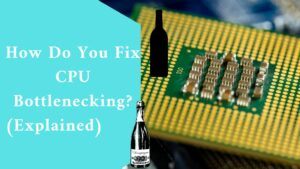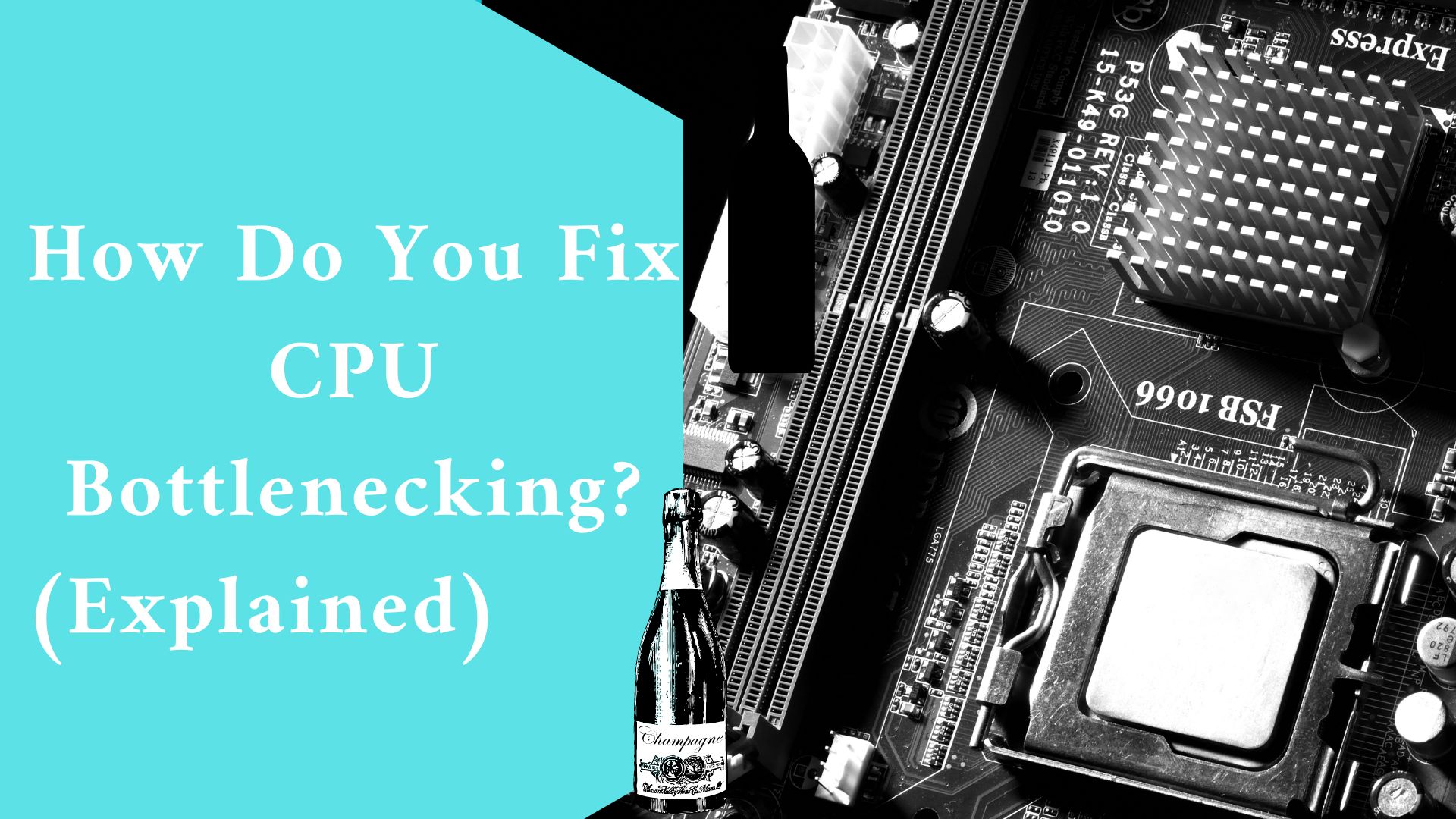Fix Bottlenecking. Everyone in the customized computer sector seemed to be using a phrase that does not make sense to the general population.
What exactly is bottlenecking? What impact does it have on me? If bottlenecking is a problem, how can I solve it?
They’re all good questions, and we’re here to help you understand bottlenecking and solve your PC bottlenecking problem.
What Exactly Is Bottlenecking?
Bottlenecking in PCs refers to a component that limits processing power or graphical performance.
]Bottlenecking is most commonly caused by discrepancies in the maximum capabilities of two components, where the maximum capacity of one part exceeds the maximum capacity of the other, resulting in a bottlenecking effect in which performance is throttled.
Imagine a large amount of water trying to escape from a bottle. It will not perform its purpose if water cannot escape the bottle because the bottleneck is too thin.
However, if the bottleneck is fairly wide, water can escape fast, which is just what you want.
This concept is analogous to computer parts, where if one part cannot “flow” quickly to another, the bottlenecking effect occurs.
A PC bottleneck is not always caused by the brand, age, or quality of parts, but rather by their performance in comparison to other parts.
This isn’t simply something that can happen in high-end custom systems. It is possible in low-cost devices if proper planning is not conducted.
Four Examples of PC Bottlenecking
- Bottlenecking of CPU/GPU
- Bottlenecking of GPU/CPU
- Bottlenecking of hard drives
- Showcase Bottlenecking
One of the most typical bottlenecks you’ll encounter in PC gaming is with your CPU (central processing unit).
-
Bottlenecking of CPU/GPU
The CPU is in charge of a slew of critical computational processes and delivers rendering instructions to the graphics processing unit (GPU).
On poorly designed devices, the CPU is frequently too weak to keep up with a strong graphics card, thus limiting the number of frames per second.
If your CPU were more powerful, you could utilize 100% of your GPU, however, it wastes time idle due to this particular bottleneck problem.
-
Bottlenecking of GPU/CPU
If you have a powerful CPU but a weaker GPU, your CPU will process the game faster than your GPU will render it.
While this may appear to be a terrible thing, it means that your computer will produce 100% of the frames it is capable of, which is precisely what you want when gaming.
That is why, before beginning your PC build, it is always a good idea to study a gaming PC building guide!
-
Bottlenecking of hard drives
One example of bottlenecking is storage. If you’re using an older device but have replaced your CPU, GPU, and RAM, the next component to replace is your old hard drive (HDD).
Older HDDs have longer load times or jitter while your software attempts to retrieve data from the HDD, which you may replace with a quicker SSD.
-
Showcase Bottlenecking
A bottleneck is caused by more than simply internal components. Assume you have a top-tier Nvidia RTX 3080 but are still gaming on a 60Hz, 1080p monitor.
While your video output will be excellent and you will be able to play games at high settings, you will not be getting the most out of your hardware, which is another form of a bottleneck.
How Do You Fix CPU Bottlenecking?
There are several methods for dealing with a CPU bottleneck, including:
- Overclocking the CPU
- Killing Other Processes
- Modify the Game Quality Settings
- Keep an eye out for CPU overheating.
- Upgared to Improve Your CPU
-
Overclocking the CPU
Overclocking the CPU will help to alleviate the problem, but it is not a permanent solution.
Furthermore, it is not appropriate for beginners because things might quickly go wrong if you have never done it before.
Furthermore, how you overclock varies depending on the CPU version, component, and manufacturer.
However, overclocking the processor offers the CPU extra breathing room, which temporarily fixes overclocking.

-
Killing Other Processes
In Task Manager, there is a “Processes” tab that lists all of the services that are currently executing on your computer.
The first category is CPU, and you can observe which applications or programs use the most CPU.
Monitoring your CPU temperature and utilization might provide insight into which applications consume the most CPU.
Once you’ve identified the processes that are causing the spike, you can disable them while you’re playing.
As a result, your CPU will only be processing game-related data. If your CPU can’t handle the number of programs running while you’re playing, your FPS will drop due to CPU overclocking.
Note
The number of cores and threads on your CPU is significant when it comes to multitasking. More cores are advantageous for multitasking.
-
Modify the Game Quality Settings
As previously stated, the CPU handles all duties on your computer, even processing data or memory stored to load graphics or components in a game.
You can, however, reduce your CPU consumption by lowering the quality of rendering-related settings like view distances, MSAA, and textures.
If graphics aren’t critical to your game, you can reduce their quality to avoid a CPU bottleneck.
-
Keep an eye out for CPU overheating.
As previously stated, an overheating CPU slows down to prevent further damage, resulting in a bottleneck. Check the thermal paste if your CPU is overheated.
If that’s the case, the issue could be with the CPU cooling. It is preferable to ensure that all of the settings are accurate and that there is adequate airflow inside the PC. You may even crank up the fan if necessary.
-
Upgrade Your CPU
All of the other ways are more or fewer band-aid solutions that will soon lead to another bottleneck.
All of the other ways simply underutilize the GPU and RAM whilst playing for your CPU to keep up. The easiest approach to completely resolve the issue is to upgrade your CPU.
Final thought
Your games may lag and stutter as a result of a CPU bottleneck, and the only approach to fix it is to address the underlying issue.
It could be due to a hot CPU, spyware, or demanding settings. And after those settings are corrected, you will be able to prevent a bottleneck.
However, the easiest solution to getting rid of the problem for good is to improve your CPU!
Related Article:
What’s the Easiest way to install My Computer CPU? (Explained)

